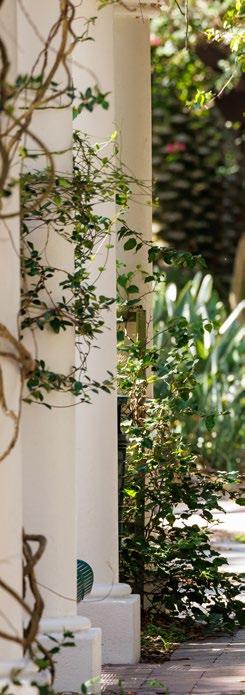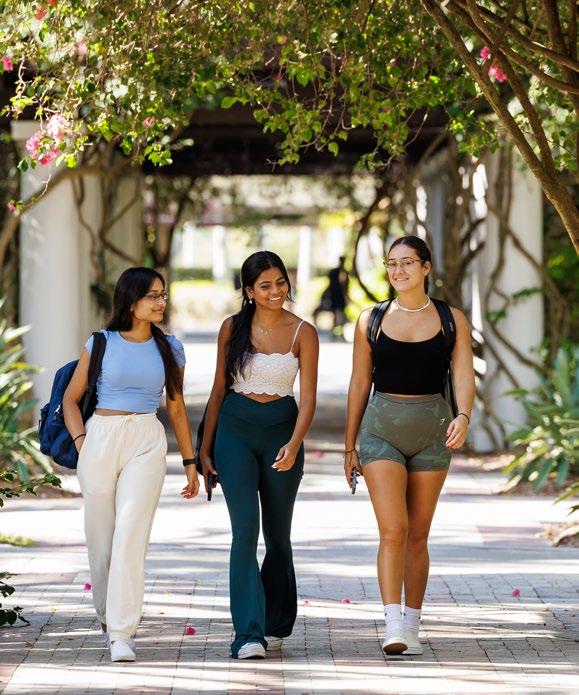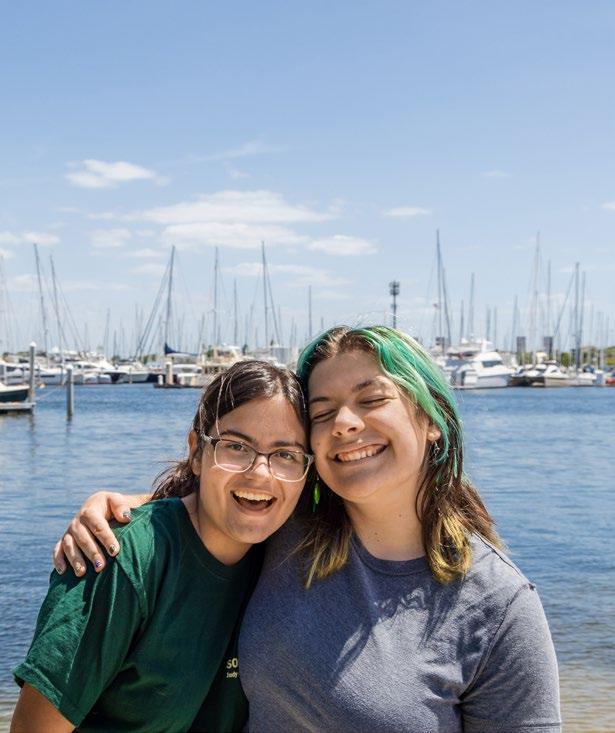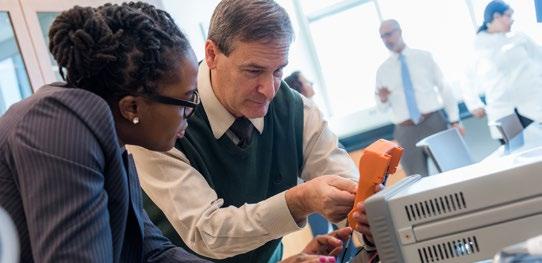



SCOTT STRADER, PHD Director, Counseling Center





SCOTT STRADER, PHD Director, Counseling Center
The Tampa campus Counseling Center takes pride in being the primary provider of mental health treatment services for our students. We are a dedicated staff of skilled mental health providers committed to meeting the mental health needs of all Bulls. Along with our off-campus partners, including TimelyCare, Protocall, Togetherall, and Therapy Assisted On-Line, and our on-campus wellness colleagues including the Center for Student Wellbeing, Student Health & Wellness Services, and the Center for Victim Advocacy and Violence Prevention, we provide students a variety of tools designed to help them improve their overall wellbeing and achieve their academic and personal goals. We value our relationships with our clients and work to understand their individual circumstances, histories, and cultural backgrounds. This knowledge helps us to meet students and clients where they are and facilitate the change they desire.
The Counseling Center experienced some unique challenges this year as we continued to adjust to the changing landscape brought about by the shortage of mental health professionals in our region and the increasing mental health needs of students. A welcomed enhancement of resources from USF for the 2023-24 year allowed us to continue hiring qualified clinicians, invest in retaining current staff, and reimagine our training programs, allowing for greater agility in reaching students and assisting them with their concerns. We were grateful for our affiliation with TimelyCare, who assisted with the provision of consistent and immediately available mental health services. As the Counseling Center worked to build a more robust and stable workforce, TimelyCare provided additional scheduled counseling and on-demand mental health services to increasing numbers of students this year, with positive results. Meanwhile, Protocall continued to offer after-hours crisis intervention, and Togetherall offered a peer-to-peer platform for students seeking peer-based support to manage concerns. This patchwork of providers created an effective tapestry that helped meet the varied needs of USF Bulls throughout the year.
Together, we are building a stronger Counseling Center, with the support of USF, strategic partnerships with off-campus mental health providers, and collaborations with on-campus colleagues who align with our mission and contribute to improving the wellbeing of the campus community. We look forward to continuing to earn the trust and respect of those we serve and work as partners toward a healthier USF.

The Mission of the Tampa campus Counseling Center is To promote the wellbeing of the campus community by providing culturally sensitive counseling, consultation, prevention, and training that enhances student academic and personal success.
Our Vision:
Flexibly meeting the changing mental health needs of a diverse campus community through sustainable inter-professional partnerships, and providing inclusive, innovative, and accessible mental health services.
Our Values:
• Integrity. Consistently practicing honesty, authenticity, transparency, and ethical decision-making
• Excellence. Remaining productive and accountable to stake holders, while flexibly innovating to enhance continued growth and development
• Collaboration. Fostering the open exchange of ideas and building upon the unique talents and strengths of others
• Inclusion. Demonstrating commitment to social justice, cultural humility, and equity in access to resources
• Balance. Striving for equilibrium among personal and professional values and needs, while maintaining growth as individuals and as an organization
At the Counseling Center:
1,736 unique clients served 4.2 percentage of overall student body served 9,888 scheduled appointments
500 single session, same-day consultations; 424 unique clients served; 190 after hours calls
4.3 average number of individual counseling sessions per client served
*YEARLY COMPARISONS OF DATA ARE COMPLICATED BY CHANGES IN STAFFING
This year, USF continued its affiliation with TimelyCare, a virtual mental health and well-being platform, providing enrolled students with free, 24/7 access to mental health services via phone or secure videoconference. TimelyCare is especially designed for college students, and can be accessed anywhere with a computer or smartphone.
In addition to scheduled counseling sessions, TimelyCare provided USF students with “TalkNow” services (24/7, on-demand emotional support), health coaching, and self-care content.
1,108 unique clients served
2.7 percentage of overall student body served
3,622 sessions provided
804 on-demand mental health (TalkNow) appointments; 377 unique clients served
3.3 average number of individual counseling sessions per client served
160 health coaching sessions; 66 unique clients served

Race/Ethnicity
Sexual Identity Gender Identity




Each USF student who used individual counseling services at the Counseling Center completed a brief pre-visit assessment to help their provider establish a baseline and assess their progress in counseling. They also completed the assessment at each follow-up appointment. The Outcome Questionnaire (OQ-45-TA) assesses functioning in multiple areas and suggests that the majority of students who use the USFCC improve their functioning over the course of their counseling experience.
These results reflect students who attended at least three (3) visits between July 1, 2023 and June 30, 2024:
68% of all students reported an improvement in functioning between their first and last visits.
75% of all students reporting symptoms related to a depressive disorder reported an improvement in functioning between their first and last visits.
Students who utilize USFCC services are invited to provide their reactions and feedback regarding their experience. We carefully review all client responses to inform our work and improve services. Once again this year, students reported positive experiences utilizing various USFCC services.
96% felt their counselor carefully listened to them
95% felt safe talking about their concerns
92% felt their counselor genuinely cared for them
93% would utilize Counseling Center services in the future if needed
91% would recommend Counseling Center services to a friend who needed help
91% reported overall satisfaction with their counseling experience at the Counseling Center

Client Feedback:
• “I’m very grateful for the time I have spent with my therapist this semester – she has helped me greatly to better understand and to be nicer to myself.”
• “I had always wanted to start counseling but was so nervous and from my very first session with my counselor she made me feel so comfortable.”
• “My counselor did very well in explaining how my cultural identities and childhood related to my therapy.”
• “She understood that because of my cultural background, certain coping mechanisms won’t work for me like it would for other students.”
• “My counselor was very trans* friendly and I would recommend her to my trans* friends! She allowed me to talk about my queer identity openly which was comforting.”
• “My counselor did very well in challenging me . . . to better myself and improve my habits throughout therapy.”
• “I absolutely enjoyed my time at the USF Counseling Center. My mental health has been better since I have utilized the center. I have leaned on the help of my counselor during stressful times throughout the semesters.”
After each session with a counselor, TimelyCare invites students to rank their satisfaction with their session, and their counselor, on a 1-5 scale (5 is the highest rating). These results showed high satisfaction with TimelyCare services.

USFCC embarked on a new initiative this year, embedding a counselor in an academic program. Serving as a pilot project, Dr. Carmen Moedano, Associate Director of Clinical Services, worked with the USF College of Engineering (COE) to develop a needs assessment and position description for the embedded counselor. The work of this counselor is focused on providing individual counseling services to students, outreach services
educating COE students, staff, and faculty on relevant mental health concerns, and consultation with COE faculty and staff. Recruitment for the position resulted in the hiring of Michelle Morton, LMHC, to serve as the first embedded counselor in COE. During the Spring Semester, Michelle was embedded in the COE for six hours per week, providing individual counseling and outreach services to more than 50 COE students, faculty, and staff.

USFCC provided group services during the 2023-24 academic year, both in-person and via secure videoconference. Groups provide students the experience of learning and developing through interaction with peers in a supportive and therapeutic environment. As in years past, students found the experience enriching and beneficial to their overall well-being and academic success.
We offered 16 general & topical groups serving 271 students
96% of students agreed that group services improved their ability to understand and interact with people who are different than they are
96% reported engaging and participating in group at a level that moved them toward their interpersonal goals
88% agreed that group improved their overall well-being
92% would recommend group counseling to a friend

What students said about participating in group counseling:
• “I think it’s a great opportunity to learn about yourself and gain self-confidence and self-esteem.”
• “This is definitely a safe and warm place where you can share your feelings and thoughts.”
• “It is so worth it, everyone is there for a reason and wants to help each other grow and become stronger.”
• “Group helped me feel better and more understood. I think everyone could use it!”
• “My counselor helped group feel safe.”

The USF Counseling Center fosters resilience among USF students and the USF community through the provision of a wide variety of outreach programming, including:
• Workshops: We deliver culturally-informed workshops focused on resiliency-based learning objectives that help students maximize their strengths, learn new ways to cope, connect with others, and prepare to be psychologically and academically successful.
• Crisis Support: We provide a compassionate presence and empathic support to groups on-campus during times of crisis.
• Tabling & Information Sharing: We are present at university events to share mental health resources, information on accessing counseling services on-campus, tips to enhance mental health and well-being, and education on common concerns expressed by USF students.
• Mental Health First Aid®: We provide this internationallyrecognized, skills-based training course that teaches participants about mental health and substance-use issues.
• Faculty and Staff Consultations: We consult with faculty and staff about how to best support USF students in and outside the classroom, on-campus, and when studying abroad.
Summary
OVERALL OUTREACH APPOINTMENTS:
OVERALL CONSULTATIONS:
OVERALL PEOPLE SERVED:

280
131
12,082


In addition to the TimelyCare virtual mental health platform, the Counseling Center offered students online support through its affiliation with Togetherall and Therapy Assisted On-line (TAO).
Togetherall is an online peer-to-peer platform that offers a safe space for students to connect with others experiencing similar feelings. Available to students online 24/7, Togetherall provides a platform for safe and anonymous peer support, with trained professionals on hand when needed. More students utilized Togetherall during the 2023-2024 year, with 1,212 students from all three USF campuses (1,103 students on the Tampa campus) utilizing the platform to enhance their mental well-being through this unique, peer-to-peer platform. This represents a more than 400% increase over 2022-2023!
Therapy Assisted On-line (TAO) is an online library of engaging, interactive resources that assists students to learn life skills and feel better. TAO quickly helps students learn new skills that have a lasting impact. Concerns including anxiety, depression, time management, grief and loss, and interpersonal functioning are addressed, along with mindfulness exercises, emotion logs, and journals that help students track their progress and gain self-awareness. TAO is also the secure and confidential videoconferencing platform used by USFCC for telehealth appointments. A total of 2,529 students across all USF campuses logged into TAO at some point over the last year, with 1,447 students logging on for the first time.

Providing training opportunities to developing clinicians is fundamental to USFCC’s mission. In the past year the Counseling Center provided mental health training through a Postgraduate Fellowship and Graduate Student Clinician programs (the Doctoral Internship was paused). Through these programs, trainees learned and applied evidence-based treatment practices relevant to college populations, while receiving competency-based supervision from the Center’s skilled training staff. Each year, USFCC staff work to create a warm and inclusive atmosphere where trainees are valued members of the team. Six trainees engaged in a training experience in the past year, three in each program. Five trainees will continue into the 2024-2025 year and the trainee who graduated from USF at the conclusion of his training program was successful in obtaining full-time job offers before his time at USFCC ended.
• Providing individual/group counseling and urgent/crisis consultation for USF students.
• Receiving weekly supervision and regular mentorship from a diverse team of clinicians.
• Conducting outreach presentations and staffing resource tables for the USF community.
• Participating in clinical team meetings, internal committees, and professional development trainings as integral members of the center.
Innovation and embracing change are core values of the USFCC training program. In 2023-2024, new initiatives and developments included:
Expanding leadership for our training programs. Dr. Crystal McLeod, DSW, LCSW, BCD was hired into a new position of Assistant Director of Training to work alongside the Associate Director of Training.
Offering all our graduate student clinicians compensation for their work at USFCC. Funding these positions not only acknowledges the value of the work of our trainees, but also expands opportunities for these positions to a wider number of graduate students.
Transforming the postdoctoral program in psychology into a multidisciplinary program, adding positions for post-master's fellows in counseling and social work. The Counseling Center's training committee was kept busy with researching requirements, developing discipline specific evaluations and policies, recruiting for positions, and onboarding the very first cohort!
Redeveloping the APA-accredited doctoral internship program in psychology. The temporary pause to accredited, inactive status allowed for a redesign the seminar & supervision structure while recruiting additional licensed psychologists with a passion for training and supervision.

Scott Strader, PhD was elected to the governing board of the Association for University and College Counseling Center Directors (AUCCCD) for a three-year term. Additionally, he continued serving as a site reviewer for the International Accreditation of Counseling Services (IACS), reviewing accreditation materials from university counseling centers across the country working to maintain their accreditation through IACS.

Michael Rogers, PhD served as chair of the Bylaws Committee for the Association of Counseling Center Training Agencies (ACCTA), and as a site visitor for the American Psychological Association Commission on Accreditation (CoA), ensuring that psychology internship programs are upholding the Standards of Accreditation set by CoA.


Lashley Marks, PsyD completed her second year as president of the Florida Group Psychotherapy Society, an affiliate of the American Group Psychotherapy Association.
Carmen Moedano, PhD, LCSW was awarded her PhD in Social Work from Bryn Mawr College in May 2024.


Rachel Gilmore, LMHC Gilmore, R., (2024, May 17-18). D&D & therapy [Conference breakout]. Social Justice in College Counseling Centers Conference, Virtual
Rachel Gilmore, LMHC & Heather Walders, LCSW Gilmore, R. & Walders, H. (2024, June 5-7). D&D & therapy [Conference breakout]. Association for University and College Counseling Center Outreach Annual Conference, Indianapolis
Walders, H. & Gilmore, R. (2024, June 5-7). Crossing over into the classroom: Meeting Student Needs Through Instructors' Communities [Conference breakout]. Association for University and College Counseling Center Outreach Annual Conference, Indianapolis

Scott Strader, PhD
Michelle Morton, LMHC
Morton, M. (2024, May 18). Poetry in motion. [Conference presentation]. NAMI Hillsborough Family Wellness Summit, Tampa.
Abbott, L., & Strader, S.C. (2023, October 25-29). Student support workshop: The role of the counseling center director on the BIT/ CARE Team and in providing violence risk assessments. [Preconference Program]. Association for University and College Counseling Center Directors Annual Conference, Nashville.
Strader, S.C., & Escoto, E. (2023, October 25-29). Money, money, money: The ABBA’s (or ABC’s) of financial literacy for nonfinancially oriented directors. [Conference breakout]. Association for University and College Counseling Center Directors Annual Conference, Nashville.
Strader, S.C., (2024, February 22-25). Reflections on grieving, coping, thriving, and advocating in an anti-woke Florida. [Invited keynote address]. American College Counseling Association Annual Conference, Orlando.
USFCC’s “Bright Side Crew” is charged with enhancing the Center’s culture of care through providing staff opportunities for connection and renewal, acknowledging milestones and transitions, and supporting a healthier work environment for all staff. This year’s larger events included a Fall door decorating contest accompanied by favorite fall treats, USFCC’s Annual Multicultural Potluck, a “St. Pie-tricks Day” spring event celebrating both Pie Day and St. Patrick’s Day, and the annual day of service at Metropolitan Ministries in Tampa. In between these events, USFCC staff gathered for happy hours, acknowledged staff transitions when individuals joined or left the Center, and celebrated the fall/winter season of giving with “undercover gift givers.” At the end of the academic year, a half-day retreat welcomed therapy dogs, an art therapist, and a psychologist with a special interest in “rhythmic cognitive restructuring” to the Center for specialized training, connection, and renewal.



